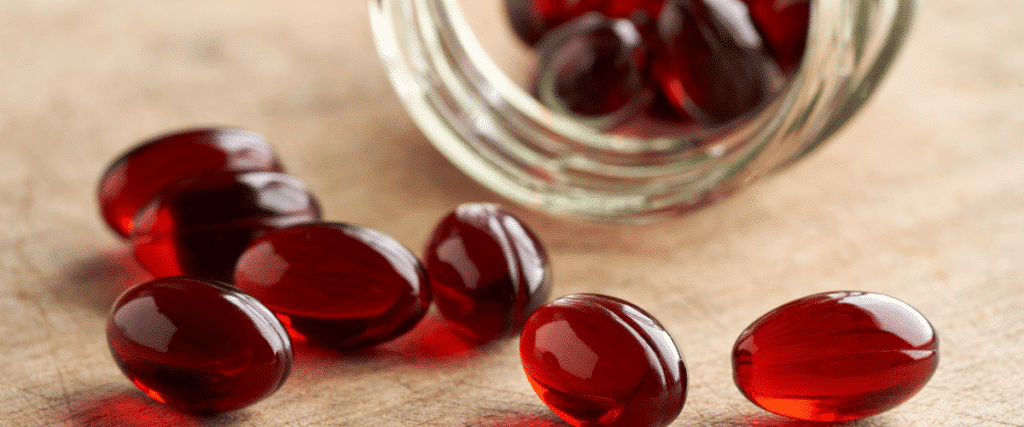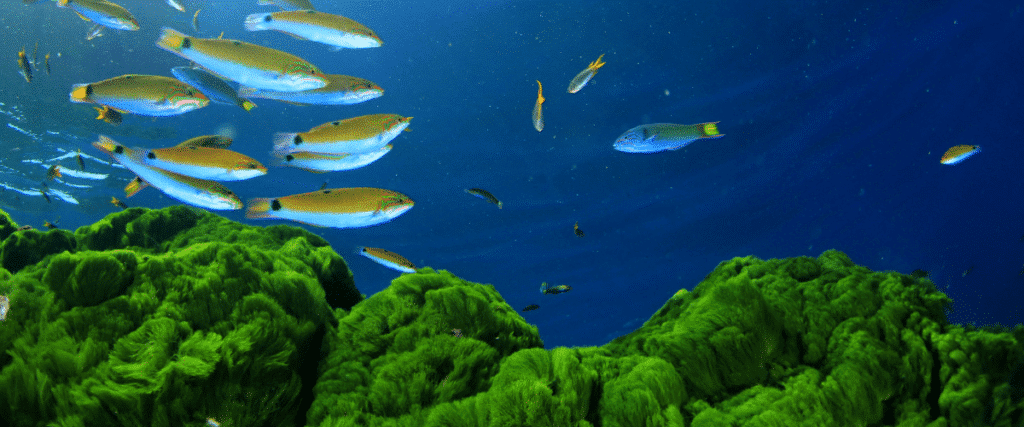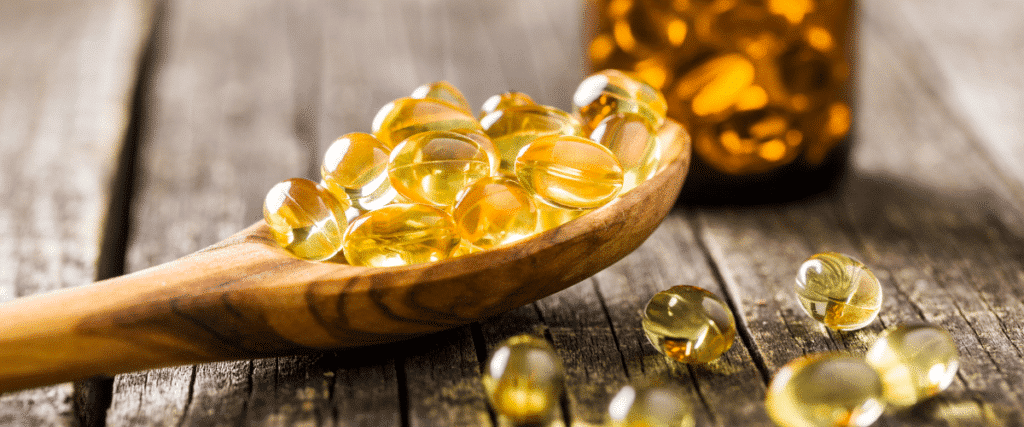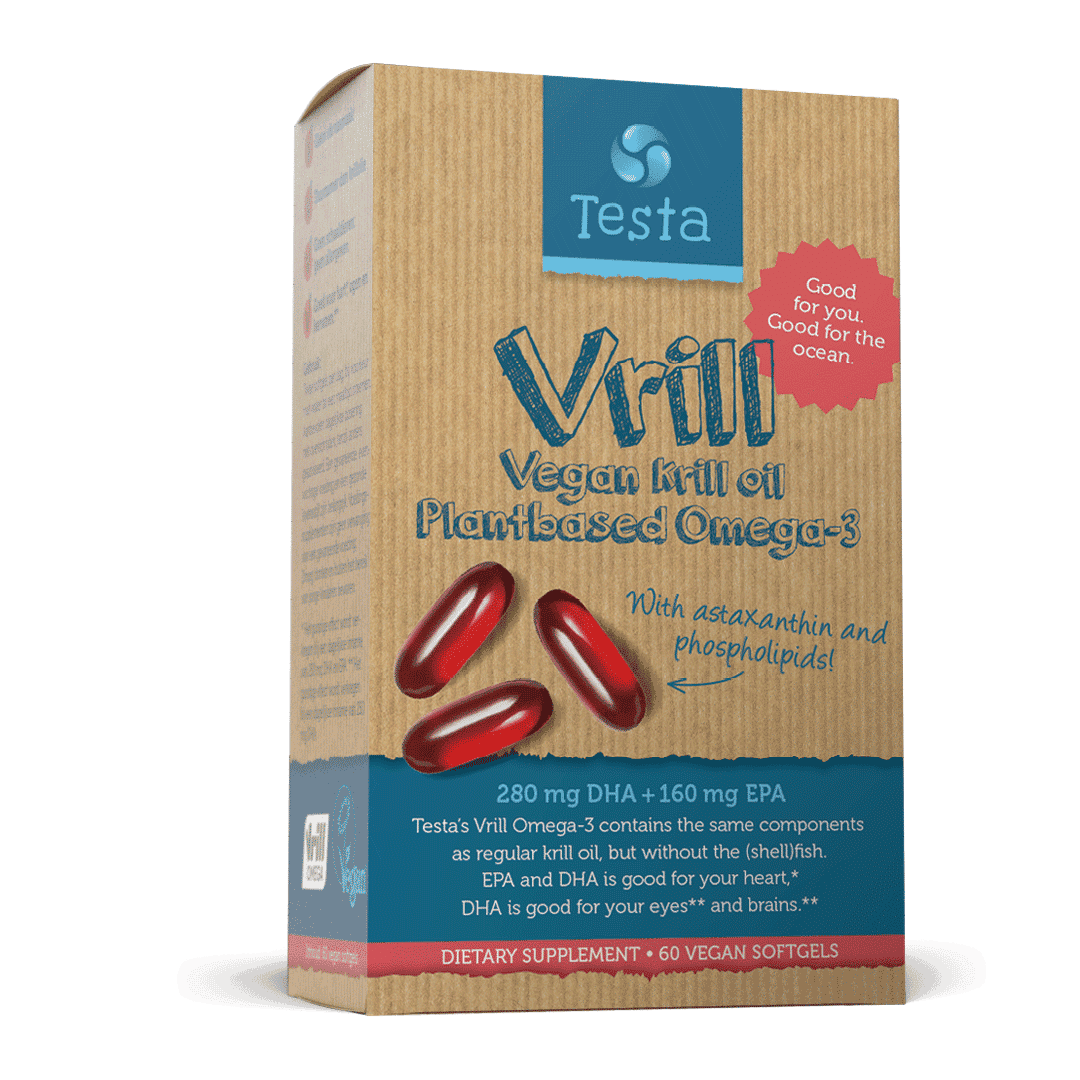Vrill Oil vs. Krill Oil vs. Fish Oil
Omega-3 fatty acids are essential to human health. Krill oil and fish oil are some of the most popular dietary supplements in the world. But while these animal-based oils may have numerous health benefits, they’re also extremely harmful to ocean ecosystems.
The good news is that there are sustainable, plant-based versions of omega-3 supplements. These alternatives to krill and fish oil are not only as good for your body, they might be better!

‘Krilling’ Our Oceans
With an estimated 400 million metric tons in the Antarctic Ocean alone, krill is one of the most abundant species on Earth. Krill are a keystone species in marine food chains, contributing iron and other nutrients that fertilize the ocean. These tiny crustaceans play an important part in the carbon cycle as they can remove up to 12 billion metric tons of carbon from the Earth’s atmosphere. The majority of the fish and sea animals in the Southern Ocean feed on clouds of krill. Animals like whales, penguins, and seals rely on them as a vital food source.
In the past 10 years, krill have become a gold mine for the dietary supplement industry, and producers of krill products promote this alternative to fish oil as environmentally friendly. Many brands claim to be “certified sustainable” and “whale and marine chain friendly”. But for all these claims, there’s no denying the alarming rate at which krill are being caught. Studies have shown that the species are facing increasing difficulty in maintaining their populations. Decreased populations lead to a weakened ecosystem as krill-dependent marine animals struggle to find food.
Because krill trawlers target the same feeding grounds as seals, penguins, and whales, these animals are often the victim of unintentional catch, a term referred to as ‘bycatch’. Despite what producers of krill oil may say, bycatch is not an uncommon occurrence.
What About Fish Oil?
Fish oil is commonly made from a fish called the Peruvian anchoveta, one of the most caught fish in the world. Like krill, the Peruvian anchoveta is a keystone species; it has a massive effect on its natural environment. While fishing industries look to limit the number of fish they catch in a year, this is to ensure population regrowth for the next fishing season. What isn’t taken into account is that decimating the population of small fish in a single season makes it harder for larger fish to find food. This begins to throw the food chain off balance which has a cascading effect on ocean ecosystems.
Regardless of the species of fish used to make fish oil supplements, trawling nets in the ocean always result in bycatch. According to Oceana, a nonprofit ocean conservation organization, an estimated 63 billion pounds of bycatch, including sharks, whales, turtles, and dolphins are caught every year. Catching ‘sustainable’ fish, like the anchoveta, causes significant damage to other sea life populations.

A Sustainable Alternative
So, if the production of fish and krill oil is unkind to the biodiversity of the oceans, and your bodies need omega-3 fatty acids, what can you do?
Don’t worry! There’s an alternative!
Contrary to what many people believe, fish and shellfish aren’t the only sources of omega-3s. This vital fatty acid is produced by algae, which is taken up the food chain when it’s eaten by fish.
Testa Vrill, a plant-based omega-3 supplement, uses Schizochytrium sp., a microalga found in the mangrove forests of the South Pacific Ocean. Because this alga is produced sustainably on land under controlled conditions, there’s no harmful impact on our oceans.
Vrill Oil vs. Krill Oil
Advocates of krill oil prefer it over fish oil because there are fewer toxins. Krill oil also doesn’t have a fishy aftertaste.
Because it’s made from algae grown on land, Vrill Oil is cleaner than krill oil. It uses only the most natural ingredients, so you won’t have any awful, fish-flavored burps.
Certain algae contain a carotenoid called astaxanthin which, when consumed, has a multitude of health benefits like immune system support and inflammation reduction. One capsule of krill oil contains 0.15 mg of astaxanthin, while Testa Vrill oil contains 0.80 mg. That’s five times the amount!
Testa Vrill Oil also contains higher amounts of omega-3 fatty acids like DHA and EPA as well as phospholipids, an important building block for cell membranes.
Omega-3s and Why You Need Them
Omega-3 fatty acids are a type of polyunsaturated fat necessary for health. They’re essential fatty acids because your body can’t make them on its own – you have to get them from your diet. Omega-3s play a vital role in body processes and promote a healthy heart, brain, and immune system. An omega-3 deficiency is connected with slower brain function, depression, and heart disease.
DHA (docosahexaenoic acid)
A type of essential fatty acid, DHA is important for healthy brain development and function. A diet full of DHA fatty acids can improve cognitive ability. Being an essential fatty acid, the body cannot create DHA on its own. It must be consumed through one’s diet.
EPA (eicosapentaenoic acid)
Your body uses this essential fatty acid to produce important signaling molecules called eicosanoids. Eicosanoids play very important physiological roles like aiding in immune system response, regulating pregnancy, and inhibiting inflammation. Like DHA, your body cannot produce enough EPA on its own for healthy functioning.
ALA (alpha-linolenic acid)
While EPA and DHA are mostly found in animal foods, ALA is mainly found in plant foods. ALA can convert into DHA and EPA, but this process is inefficient in humans. Only a very small amount of ALA is converted into essential fatty acids.
The Health Benefits of DHA & EPA
DHA and EPA can promote health during pregnancy by helping with brain, eye, and nervous system development. They can also prevent pre-term labor and delivery, and increase birth weight. These essential fatty acids support a mother’s mood during the postpartum period, which can be a time of lethargy and depression for many women.
Studies have shown that DHA and EPA may help with young children’s moods and improve brain function, particularly learning and memory.
During the adult years, EPA and DHA can fight inflammation, autoimmune diseases, and heart disease. Menstrual pain and associated mood swings may be alleviated in women who make sure to consume foods or supplements rich in essential fatty acids.

Do Plant-Based Foods Contain Omega-3 Fatty Acids?
Yes! While the most well-known sources of omega-3 fatty acids are fatty fish and fish oil, many plant foods contain ALA. Chia seeds, Brussels sprouts, hemp seeds, walnuts, flaxseed, and perilla oil all contain substantial amounts of ALA.
Remember that ALA cannot be converted into enough DHA and EPA to keep the body functioning healthily. That’s why it’s important for anyone not wanting to consume fish oil or krill oil to make sure they take a plant-based supplement, like algae oil, to get this holy trinity of Omega-3s into their daily diet.
Plant-Powered is Best
While there is no official recommended daily intake of EPA and DHA, most health organizations recommend a daily minimum of 250-500mg of DHA and EPA combined for healthy adults. During pregnancy and nursing, it’s recommended that women take an additional 200-330mg of DHA. People with certain health conditions like heart disease, cancer, and mood disorders may need to take higher amounts. The recommended serving for children depends on their age and health requirements.
Most fish oil and krill oil supplements contain low doses of EPA and DHA. Because Testa Vrill Oil is made from microalgae, each capsule contains higher amounts of omega-3s. This means you can take just one capsule a day to maintain healthy omega-3 levels.
How is Testa Omega-3 Made?
Schizochytrium sp. is a microalga that grows in the mangrove forests of the South Pacific Ocean. Because it’s rich in omega-3 fatty acids like EPA and DHA, algae oil has been used for years in food and as a food supplement.
This microalga isn’t grown in ponds but is carefully cultivated in sterile fermenters under controlled conditions. Because it’s not grown in the ocean, there’s no impact from ocean pollution which means Testa oils are free from heavy metals, dioxins.
During a fermentation process, algae cells convert dextrose into omega-3 fatty acids that accumulate in oil cells. During processing, the cell wall is broken down and the oil is separated from the water. The result is a highly concentrated algae oil, containing more essential fatty acids than krill or fish oil.
Other Ingredients in Testa Plant-Based Products
Testa plant-based products also contain several other health-boosting ingredients:
Vitamin D3 – Because it helps the body absorb calcium, this essential nutrient is vital in maintaining healthy bones and teeth. It can also boost immunity, improve mood, and reduce inflammation. Vitamin D3 is typically extracted from lamb’s wool, making the ingredient not vegan friendly. However, Testa Vitamin D3 is 100% plant-based!
Phospholipids -A type of fat present in both animal and plant cells, phospholipids help the body to absorb fats and fat-soluble nutrients like omega-3s. They also support brain health and development, healthy liver function, and a strong gut lining.
Astaxanthin – An antioxidant that protects cells from damage, astaxanthin improves immune system function, improves athletic performance, and can ease muscle soreness brought on by exercise.
The Take-Away
For years it was thought that fish, fish oil, and krill oil were the only sources of omega-3 fatty acids that could provide the human body with the amount it needed for healthy functioning. This belief led to the rising popularity of animal-based oil supplements which has harmed our oceans and affected ecosystems.
But now there’s an alternative; Testa plant-based products aren’t just good for you, they’re good for the ocean too! As an ethical consumer, what’s keeping you from making the change?
Vegan Krill oil DHA & EPA omega-3
Pure, fish-free and 100% vegan. Good for heart, brain and eyes.
